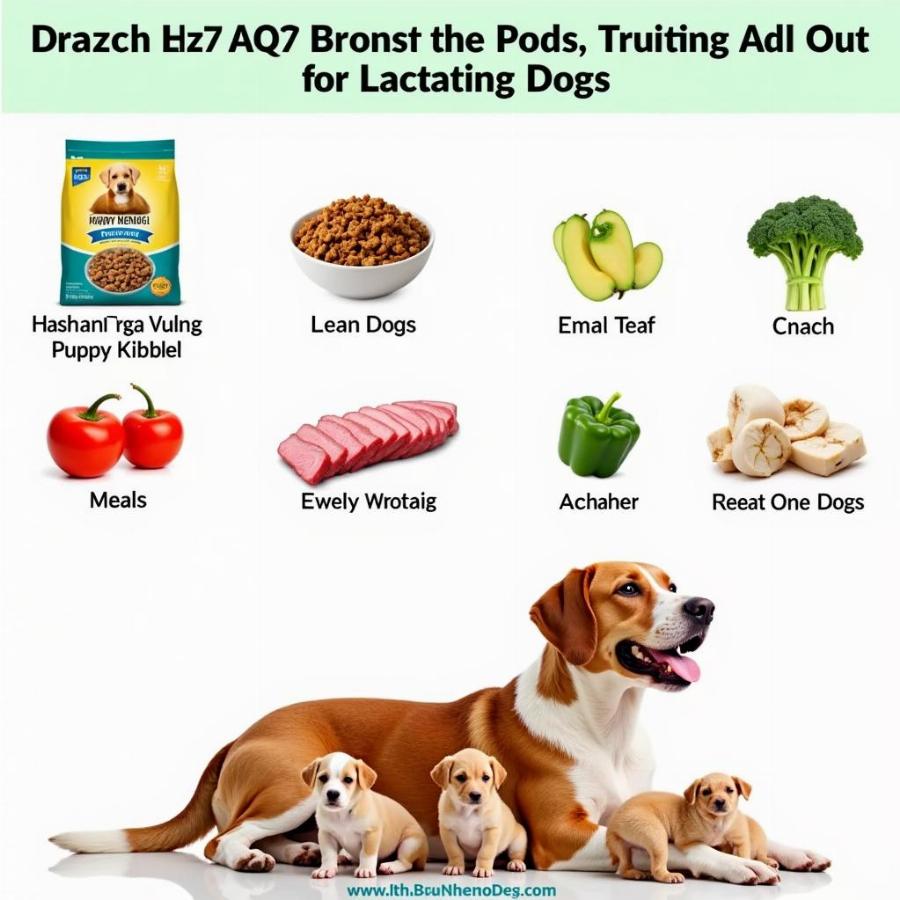A nursing mother dog needs proper nutrition to produce enough milk for her puppies. Understanding which foods to increase dog milk production is crucial for the health of both the mother and her litter. This article dives into the dietary needs of lactating dogs and provides a comprehensive guide to help you choose the best foods to support healthy milk production.
Boosting Milk Supply: The Best Foods for Lactating Dogs
 Thức ăn tăng sữa cho chó mẹ
Thức ăn tăng sữa cho chó mẹ
When your dog is nursing, her nutritional needs increase significantly. Simply feeding her regular adult dog food isn’t enough. She needs a diet rich in protein, healthy fats, and essential vitamins and minerals to support milk production and her own recovery after birth. High-quality puppy food is an excellent choice as it is formulated to meet the needs of growing puppies and, consequently, provides the necessary nutrients for milk production in the mother. Consider adding lean meats like chicken and fish, which are excellent sources of protein, to her diet. Small amounts of cooked vegetables like sweet potatoes and carrots can provide added vitamins and minerals.
Natural Ways to Increase Dog Milk Production
Beyond conventional foods, some natural remedies can also support milk production. Alfalfa, available in supplement form, is known for its milk-boosting properties in lactating animals. Similarly, fenugreek, another herbal supplement, has been traditionally used to support lactation. Consult your veterinarian before introducing any supplements to your dog’s diet. Remember that while these natural remedies can be helpful, they should complement a balanced diet, not replace it.
What to Avoid Feeding a Nursing Dog
Just as important as knowing what to feed a nursing dog is understanding what to avoid. Certain foods can be detrimental to both the mother and her puppies. Avoid foods high in artificial preservatives, colors, and flavors. Rich, fatty foods can lead to digestive upset and potentially pancreatitis. Never give a nursing dog chocolate, grapes, raisins, onions, or garlic, as these are toxic to dogs.
Understanding Your Dog’s Nutritional Needs During Lactation
A lactating dog’s nutritional needs are significantly higher than a non-lactating dog’s. They require more calories, protein, and fat to support milk production. The amount of food needed varies depending on the dog’s size, breed, and the number of puppies she is nursing. Always monitor your dog’s weight and adjust her food intake accordingly. If she appears to be losing weight excessively, consult your veterinarian.
Conclusion
Choosing the right foods to increase dog milk production is vital for the health and well-being of both the mother and her puppies. A diet rich in protein, healthy fats, and essential nutrients will ensure adequate milk supply and support the mother’s recovery. Remember to consult your veterinarian for personalized dietary recommendations and before introducing any new supplements.
FAQ
- What is the best food for a nursing dog? High-quality puppy food is generally recommended.
- Can I give my dog supplements to increase milk production? Consult your veterinarian before giving any supplements.
- What foods should I avoid giving a nursing dog? Avoid foods high in fat, artificial ingredients, and toxic substances like chocolate and grapes.
- How much should I feed my nursing dog? The amount varies depending on the dog’s size, breed, and litter size. Consult your veterinarian for guidance.
- What are some signs of low milk production in dogs? Restless puppies, excessive crying, and failure to gain weight are potential signs.
Beaut Dogs: Your Guide to Canine Care
Beaut Dogs is your one-stop resource for all things related to dog care. We provide expert advice and comprehensive information on various aspects of dog ownership, from choosing the right breed to providing optimal nutrition and healthcare. When you need expert advice, contact us at Email: [email protected] and Beaut Dogs will provide you with detailed and accurate answers.